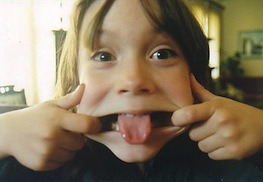Unschooler's Pipe Wrench
Deb Lewis

Unschoolers sometimes talk about having tools in their toolbox. No, unschoolers are not all plumbers. They're referring to a store of good ideas to shop around in to help in this business of living. I have one tool I use more than any other. A pipe wrench! No, it's humor.
I think humor is an especially useful tool for unschoolers. It's useful in the same way a pipe wrench is useful. You can clobber Aunt Martha with it when she's hounding you about how your kid spells "plumer," but it's better than a pipe wrench in that there's no body to dispose of and no awkward explanations to family members and forensics experts.
And studies are now popping up suggesting laughter makes our brains work better, reduces stress and helps sick people get well. St. Jude's Children's hospital is part of a five-year study about laughter and improved medical outcome. The study may very well expand on a finding by the renowned Dr. Seuss, which says, in part, "Today was good, today was fun. Tomorrow is another one."
Laughter has helped my own family through hard times. Sure we would have come through the hard times anyway, but we came through them with less stress, fewer lasting scars, and lots of great one-liners.
When my mom was young, in what she believed was a clever move to impress my grandmother, she recited the poem "Casabianca." It is a poem about a boy who dies at his post on a ship after all other crewmen have left or been killed. That's funny, right? My mother says she recited it perfectly, and she thought the boy was very brave. When she spoke the last, dramatic lines, "But the noblest thing which perished there/ Was that young faithful heart," her mother said, "Well, the Jackass!"
I could picture the whole thing when she told me the story. I agreed with my Grandma. I was amused. It was the first time I realized people are not all amused by the same things. From an unschooling point of view, the poem is hard to like. Are we supposed to believe it was good for the kid, aka "Jackass," to stand there and burn up because his father had given him an order? A smart kid would have left the ship! An unschooling kid probably would have put out the fire, found his father, performed CPR, and steered the ship out of range of enemy fire.
My siblings and I revised that poem when we were kids. I can't remember all of it, but it began, "The boy stood on the burning deck, eating peanuts by the peck." I think we set his hair alight in some later, silly lines, but now it's all hazy. I don't remember ever reading any other of Hemans' poetry as a kid, not even in school. All my teachers seemed to be in love with Longfellow, another writer of melodramatic poetry. So, it seems there are people who are moved by poems like Hemans' "Casabianca" or Longfellow's "Wreck of the Hesperus," but not moved in a humorous way.

There's a down side to being an easily amused person. Normal people reprimand you when the recitation of a few lines of dramatic poetry has you in stitches. There are whispers and odd looks in the grocery store when you suddenly say to the produce display, "Time flies like an arrow; Fruit flies like a banana." Strangers do not understand seemingly random outbursts of laughter, and they'd be terrified if they could somehow hear the internal dialog that precedes such an outburst.
Still, it's better than being an easily depressed person. Life can include a lot of hurtful things. There's something seductive about depression; something welcoming in that dark spiral downward where all our secret beliefs about unfairness and misery are finally qualified. I think most people have had times when they looked into that dark pit, but luckily most turn around and look up and start slogging toward something brighter.
Most people live somewhere in between those extremes, neither too silly nor too sad. My family is rolling on the floor at the silly end of the spectrum. We understand we don't always have a choice about what life brings us, but we always have a choice about how we face it. And we face it wearing big red clown noses.
|
And life is stormy. But life is not quite the "Wreck of the Hesperus."
We've had a couple of tough years. Sometimes we think, "Ok! The rough patch is past," but we still hear the thunder in the distance. Unlike the Captain in "Wreck of the Hesperus," I don't intend to bind my kid to the mast of a doomed ship. I'll follow the advice of the old sailor and put into yonder port. For us that's the safe harbor of humor.
I don't think humor will guarantee my kid will have a better life, but I know it won't hurt him. If all it does is leave him with happy memories of his childhood and parents, I'll count it among our most useful tools.

